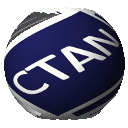Directory macros/latex/contrib/moreenum
README
This is the README for moreenum.sty
The author/maintainer of this work is Seamus Bradley.
tex@seamusbradley.net
This provides the following new enumerate styles.
- \greek for lowercase Greek letters
- \Greek for uppercase Greek letters
- \enumHex for uppercase hexadecimal enumeration
- \enumhex for lowercase hexadecimal enumeration
- \enumbinary for binary enumeration
- \enumoctal for octal enumeration
- \raisenth for 1st, 2nd, 3rd etc with raised "th"s
- \levelnth for 1st, 2nd 3rd with level "th"s
- \Nthwords for "First", "Second", "Third" etc
- \nthwords for "first", "second", "third" etc
- \NTHWORDS for "FIRST", "SECOND", "THIRD" etc
- \Nwords for "One", "Two", "Three" etc
- \nwords for "one", "two", "three" etc
- \NWORDS for "ONE", "TWO", "THREE" etc
Each of these works with enumitem's "starred variant" feature.
So \begin{enumerate}[label=\Hex*] will output a hex enumerated list.
Enumitem provides a start=0 option for starting your enumerations at
0.
A binzero environment is provided for binary starting at zero enumeration.
Likewise enumoctzero, enumHexzero and enumhexzero for the hex enumerations.
Currently requires amsmath, alphalph, enumitem and fmtcount
all of which should be part of any modern TeX distribution.
This isn't so much a package designed for use as a list of recipes for
creating your own new kinds of enumeration.
All of the work is really done by the various packages loaded.
TWO WARNINGS:
- You probably don't want to use uppercase greek numbering. Ever.
- Be careful with uppercase Hex numbering for sections if you also
have appendices.
- (A more general version of the last point) Don't mix \Alph and
\enumHex, or \alph and \enumhex
TO DO:
- Properly namespace the internal macros.
- Make consistent the way the macros for counters and numbers are
treated.
- Test spacing of enumerations.
CHANGELOG
See https://github.com/scmbradley/moreenum for a full changelog
v1.02
Spacing issues fixed
\nwords and friends and \nthwords and friends are now the right way round.
v1.01
NWORDS and friends now supported
v1.0
levelnth and raisenth work with fmtcount
fmtcount also replaces binhex.tex
fmtcount also replaces numname
v0.95
levelnth and raisenth work through environments with engord's switch
numname used for nwords and nthwords
v0.9
Initial version
Download the contents of this package in one zip archive (216.8k).
moreenum – More enumeration options
The package provides the following new enumerate styles:
- \greek for lowercase Greek letters;
- \Greek for uppercase Greek letters;
- \enumHex for uppercase hexadecimal enumeration;
- \enumhex for lowercase hexadecimal enumeration;
- \enumbinary for binary enumeration;
- \enumoctal for octal enumeration;
- \levelnth for “1st”, “2nd”, “3rd” etc., with the “nth”s on the baseline;
- raisenth for “1st”, “2nd”, “3rd” etc., with the “nth”s raised;
- \nthwords for “first”, “second“, “third” etc.;
- \Nthwords for “First”, “Second”, “Third” etc.;
- \NTHWORDS for “FIRST”, “SECOND”, “THIRD” etc.;
- \nwords for “one”, “two”, “three” etc.;
- \Nwords for “One”, “Two”, “Three” etc.; and
- \NWORDS for “ONE”, “TWO”, “THREE” etc.
Each of these works with enumitem’s “starred variant” feature. So \begin{enumerate}[label=\enumhex*] will output a hex enumerated list. Enumitem provides a start=0 option for starting your enumerations at 0.
The package requires amsmath, alphalph, enumitem (of course), binhex and nth, all of which are widely available.
| Package | moreenum |
| Version | 1.03 |
| Licenses | The LaTeX Project Public License 1.3 |
| Maintainer | Seamus Bradley |
| Contained in | TeX Live as moreenum MiKTeX as moreenum |
| Topics | List enumumerate Numbers |
